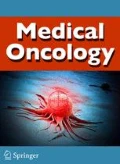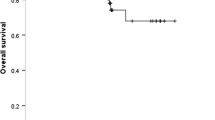Abstract
The epidermal growth factor receptor (EGFR) mutation status has become one of the most important factors in the treatment of non-small cell lung cancer. However, the relationship between EGFR mutation and the histologic subtype of lung adenocarcinoma remains to be fully elucidated. We examined the relationship between the predominant subtype of adenocarcinoma and the prognosis and investigated the correlation between a new subtype of adenocarcinoma and EGFR mutations. This study included 182 patients with adenocarcinoma who underwent complete resection. The rate of EGFR mutation-positive patients was significantly higher among female patients, never smokers, patients with small tumors (< 3 cm in size), patients with well-differentiated tumors, and patients with a pStage I classification. The rates of adenocarcinoma in situ (AIS), minimally invasive adenocarcinoma (MIA), and lepidic-predominant subtype were high in male EGFR mutation-positive patients. The prevalence of the acinar and papillary-predominant subtypes was high among EGFR mutation-positive female patients, as was AIS, MIA, and the lepidic-predominant subtype. The progression-free survival (PFS) of the EGFR mutation-positive patients was significantly better than that of the EGFR mutation-negative patients (75.8 vs 67.1%, p = 0.03). However, the multivariate analysis of clinicopathologic and histologic factors did not reveal the prognostic impact of the EGFR mutation status on PFS. The overall survival (OS) of the EGFR mutation-positive patients was significantly better than that of the EGFR mutation-negative patients (93.7 vs 63.4%, p < 0.01). However, in the multivariate analysis the EGFR mutation status was not significantly associated with OS.


Similar content being viewed by others
References
Torre LA, Bray F, Siegel RL, Ferlay J, Lortet-Tieulent J, Jemal A. Global cancer statistics, 2012. CA Cancer J Clin. 2015;65:87–108.
Lemjabbar-Alaoui H, Hassan OU, Yang YW, Buchanan P. Lung cancer: biology and treatment options. Biochem Biophys Acta. 2015;1856:189–210.
Ettinger DS, Akerley W, Borghaei H, Chang AC, Cheney RT, Chirieac LR, et al. Non-small cell lung cancer, version 2.2013. J Nat Compr Cancer New. 2013;11:645–53.
Travis W, Brambilla E, Noguchi M, Nicholson A, Geisinger K, Yatabe Y. International association for the study of lung cancer/American Thoracic Society/European Respiratory Society international multidisciplinary classification of lung adenocarcinoma. J Thorac Oncol. 2011;6(2):244–85.
Hirscha FR, Scagliottib GV, Langerc CJ, Varella-Garciaa M, Franklina WA. Epidermal growth factor family of receptors in preneoplasia and lung cancer: perspectives for targeted therapies. Lung Cancer. 2003;41:S29–42.
Kris MG, Natale RB, Herbst RS, Lynch TJ, Prager D, Belani CP, et al. Efficacy of gefitinib, an inhibitor of the epidermal growth factor receptor tyrosine kinase, in symptomatic patients with non-small cell lung cancar. JAMA. 2003;290:2149–58.
Pérez-Soler R, Chachoua A, Hammond LA, Rowinsky EK, Huberman M, Karp D, et al. Determinants of tumor response and survival with erlotinib in patients with non–small-cell lung cancer. J Clin Oncol. 2004;22:3238–47.
Maemondo M, Inoue A, Kobayashi K, Sugawara S, Oizumi S, Isobe H, et al. Gefitinib or chemotherapy for non–small cell lung cancer with mutated EGFR. N Engl J Med. 2010;362:2380–8.
Mok TS, Wu YL, Thongprasert S, Yang CH, Chu DT, Saijo N, et al. Gefitinib or carboplatin–paclitaxel in pulmonary adenocarcinoma. N Engl J Med. 2009;361:947–57.
Shepherd FA, Pereira JR, Ciuleanu T, Tan EH, Hirsh V, Thongprasert S, et al. Erlotinib in previously treated non-small-cell lung cancer. N Engl J Med. 2005;353:123–32.
Lynch TJ, Bell DW, Sordella R, Gurubhagavatula S, Okimoto RA, Brannigan BW, et al. Activating mutations in the epidermal growth factor receptor underlying responsiveness of non-small-cell lung cancer to gefitinib. N Engl J Med. 2004;350:2129–39.
Mitsudomi T, Kosaka T, Yatabe Y. Biological and clinical implications of EGFR mutations in lung cancer. Int J Clin Oncol. 2006;11:190–8.
Yoshizawa A, Sumiyoshi S, Sonobe M, Kobayashi M, Fujimoto M, Kawakami F, et al. Validation of the IASLC/ATS/ERS Lung Adenocarcinoma Classification for Prognosis and Association with EGFR and KRAS gene mutations analysis of 440 japanese patients. J Thorac Oncol. 2013;8:52–61.
Villa C, Cagle PT, Johnson M, Patel JD, Yeldandi AV, Raj R, et al. Correlation of EGFR mutation status with predominant histologic subtype of adenocarcinoma according to the New Lung Adenocarcinoma Classification of the International Association for the Study of Lung Cancer/American Thoracic Society/European Respiratory Society. Arch Pathol Lab Med. 2014;138:1353–7.
Maturu VN, Singh N, Bal A, Gupta N, Das A, Behera D. Relationship of epidermal growth factor receptor activating mutations with histologic subtyping according to International Association for the Study of Lung Cancer/American Thoracic Society/European Respiratory Society 2011 adenocarcinoma classification and their impact on overall survival. Lung India. 2016;33:257–66.
Zhang Y, Sun Y, Pan Y, Li C, Shen L, Li Y, et al. Frequency of driver mutations in lung adenocarcinoma from female never-smokers varies with histological subtypes and age at diagnosis. Clin Cancer Res. 2012;18(7):1947–53.
Shim HS, Lee DH, Park EJ, Kim SH. Histopathologic characteristics of lung adenocarcinomas with epidermal growth factor receptor mutations in the International Association for the Study of Lung Cancer/American Thoracic Society/European Respiratory Society Lung Adenocarcinoma Classification. Arch Pathol Lab Med. 2011;135:1329–34.
Song Z, Zhu H, Guo Z, Wu W, Sun W, Zhang Y. Correlation of EGFR mutation and predominant histologic subtype according to the new lung adenocarcinoma classification in Chinese patients. Med Oncol. 2013;30:645.
Chen Z, Liu X, Zhao J, Yang H, Teng X. Correlation of EGFR mutation and histological subtype according to the IASLC/ATS/ERS classification of lung adenocarcinoma. Int J Clin Exp Pathol. 2014;7(11):8039–45.
Russell PA, Barnett SA, Walkiewicz M, Wainer Z, Conron M, Wright GM, et al. Correlation of mutation status and survival with predominant histologic subtype according to the New IASLC/ATS/ERS lung adenocarcinoma classification in Stage III (N2) patients. J Thorac Oncol. 2013;8:461–8.
Lu F, Li S, Dong B, Zhang S, Lv C, Yang Y. Identification of lung adenocarcinoma mutation status based on histologic subtype: Retrospective analysis of 269 patients. Thorac Cancer. 2016;7:17–23.
Sun Y, Yu X, Shi X, Hong W, Zhao J, Shi L. Correlation of survival and EGFR mutation with predominant histologic subtype according to the new lung adenocarcinoma classification in stage IB patients. World J Surg Oncol. 2014;12:148.
Mitsudomi T, Morita S, Yatabe Y, Negoro S, Okamoto I, Tsurutani J, et al. Gefitinib versus cisplatin plus docetaxel in patients with non-small-cell lung cancer harbouring mutations of the epidermal growth factor receptor (WJTOG3405): an open label, randomised phase 3 trial. Lancet Oncol. 2010;11:121–8.
Hirsch FR, Jänne PA, Eberhardt WE, Cappuzzo F, Thatcher N, Robert Pirker R, et al. Epidermal growth factor receptor inhibition in lung cancer: status 2012. J Thorac Oncol. 2013;8:373–84.
Shi Y, Au JSK, Thongprasert S, Srinivasan S, Tsai CM, Khoa MT, et al. A prospective, molecular epidemiology study of EGFR mutations in Asian patients with advanced non-small-cell lung cancer of adenocarcinoma histology (PIONEER). J Thorac Oncol. 2014;9:154–62.
Jackman DM, Yeap BY, Sequist LV, Lindeman N, Holmes AJ, Joshi VA, et al. Exon19 deletion mutations of epidermal growth factor receptor are associated with prolonged survival non-small cell lung cancer patients treated with gefitinib or erlotinib. Clin Cancer Res. 2006;12:3908–14.
Sasaki H, Shimizu S, Endo K, Takada M, Kawahara M, Tanaka H, et al. EGFR and erbB2 mutation status in japanese lung cancer patients. Int J Cancer. 2006;118:180–4.
Liu WS, Zhao LJ, Pang QS, Yuan ZY, Li B, Wang P. Prognostic value of epidermal growth factor receptor mutations in resected lung adenocarcinomas. Med Oncol. 2014;31:771.
Kobayashi N, Toyooka S, Ichimura K, Soh J, Yamamoto H, Matsuo K, et al. Non-BAC component but not epidermal growth factor receptor gene mutation is associated with poor outcomes in small adenocarcinoma of the lung. J Thorac Oncol. 2008;3:704–10.
Kosaka T, Yatabe Y, Endoh H, Kuwano H, Takahashi T, Mitsudomi T. Mutations of the epidermal growth factor receptor gene in lung cancer: biological and clinical implications. Cancer Res. 2004;64:8919–23.
Lim KH, Huang MJ, Liu HC, Kuo HT, Tzen CY, Hsieh RK. Lack of prognostic value of EGFR mutations in primary resected non-small cell lung cancer. Med Oncol. 2007;24(4):388–93.
Nose N, Sugio K, Oyama T, Nozoe T, Uramoto H, Iwata T, et al. Association between estrogen receptor expression and epidermal growth factor receptor mutation in the postoperative prognosis of adenocarcinoma of the lung. J Clin Oncol. 2008;27:411–7.
Author information
Authors and Affiliations
Corresponding author
Ethics declarations
Conflict of interest
The authors declare no conflict of interest.
Ethical approval
The study was approved by Ethics Committee of the Kanazawa Medical University in Japan.
Informed consent
All the study participants gave their written informed consent to participation in the study.
Rights and permissions
About this article
Cite this article
Motono, N., Funasaki, A., Sekimura, A. et al. Prognostic value of epidermal growth factor receptor mutations and histologic subtypes with lung adenocarcinoma. Med Oncol 35, 22 (2018). https://doi.org/10.1007/s12032-018-1082-y
Received:
Accepted:
Published:
DOI: https://doi.org/10.1007/s12032-018-1082-y




